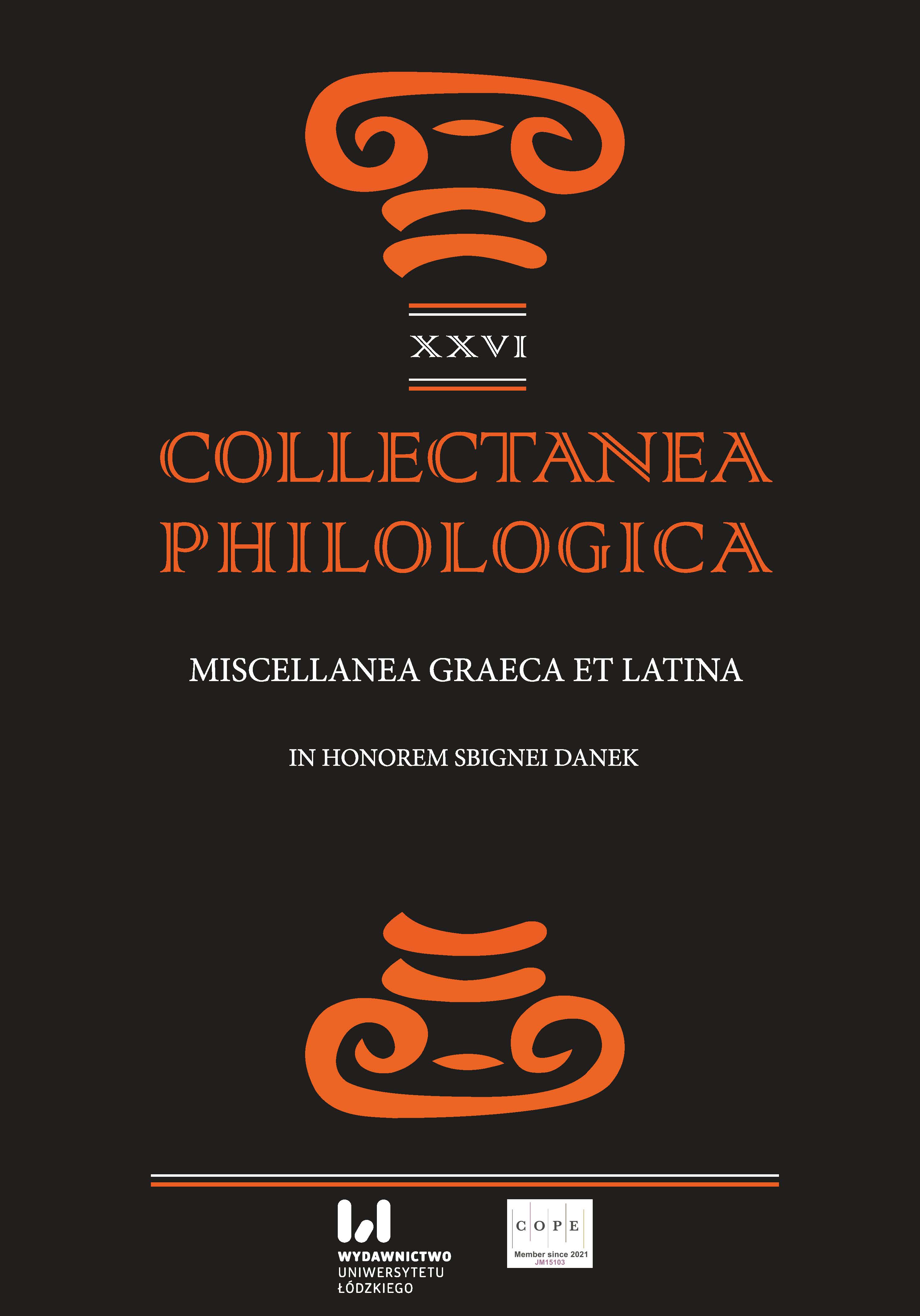Dramatyczne prologi w diegematycznych dialogach Platona
DOI:
https://doi.org/10.18778/1733-0319.26.05Słowa kluczowe:
Platon, dialog diegematyczny, prolog, narratorAbstrakt
In Plato’s diegetic dialogues, as well as in dramatic works, you can find a distinctive feature, an autonomous part opening the work, which is usually called “a prologue”. This term is taken from an ancient Greek drama and means in literal translation “before the content”. In dramatic scenes, which precede the main narrative part of Plato’s dialogues, one of the characters is so interested in the discussion held by Socrates in more or less distant past, that he asks the discussion participant or the person who has some knowledge about it to relate him the debate. The aim of this analysis are the prologues in Protagoras, Phaedo, Symposium, Euthydemus and Theaetetus to answer the question what function in Plato’s dialogue structure they play.
Bibliografia
Commentary on the Theaetetus. (2019). Transl. by G. Boys-Stones. University of Toronto. https://www.academia.edu/6394469/Anonymous_commentary_on_Platos_Theaetetus [27.01.2023].
Google Scholar
Diogenis Laertii Vitae philosophorum. (2008). Vol. I. libri I-X. M. Marcovich (ed.). Berlin: W. de Gruyter.
Google Scholar
Platon. (2005a). Dialogi. Przeł. i oprac. W. Witwicki. T. I. Kęty: Wydawnictwo ANTYK.
Google Scholar
Platon. (2005b). Dialogi. Przeł. i oprac. W. Witwicki. T. II. Kęty: Wydawnictwo ANTYK.
Google Scholar
Platon. (2017). Fedon. Przeł. i komentarzem opatrzył R. Legutko. Kraków, Warszawa: Państwowy Instytut Wydawniczy.
Google Scholar
Platone. (2000). Simposio. Traduzione, saggio introduttivo, traduzione e note di G. Reale. Milano: Bompiani.
Google Scholar
Platone. (2001). Protagora. Prefazione, saggio introduttivo, traduzione e note di G. Reale. Milano: Bompiani.
Google Scholar
Platone. (2002). Fedone. Prefazione, saggio introduttivo, traduzione, note, apparati e inserto iconografico di G. Reale. Milano: Bompiani.
Google Scholar
Chiżyńska, K. et al. (2020). Starożytny teatr i dramat w świetle pism scholiastów. Leksykon. Łódź: Wydawnictwo Uniwersytetu Łódzkiego.
Google Scholar
Danek, Z. (2000). Myślę, więc nie wiem. Próba interpretacji Platońskiego dialogu „Teajtet”. Łódź: Wydawnictwo Uniwersytetu Łódzkiego.
Google Scholar
Dawidowicz, T. (1986). Narrator w diegematycznych dialogach Platona. Maszynopis pracy doktorskiej. Toruń: Uniwersytet Mikołaja Kopernika.
Google Scholar
Gauss, H. (1958). Philosophisher Handkommentar zu den Dialogen Platos. T. II/1. Bern: Herbert Lang.
Google Scholar
Głodowska, A. (2005). Starożytna teoria Platońskiego dialogu. W: W. Wróblewski (red.). W kręgu Platona i jego dialogów. Toruń: Wydawnictwo Uniwersytetu Mikołaja Kopernika. 9–101.
Google Scholar
Głodowska, A. (2009). Il tempo nei dialoghi platonici (“Protagora”, “Simposio”, “Fedro”). W: J. Czerwińska et al. (red.). Kategorie i funkcje czasu w ujęciu starożytnych. Łódź: Wydawnictwo Uniwersytetu Łódzkiego. 117–131.
Google Scholar
Głodowska, A. (2019). „Funkcja i znaczenie prologu w Protagorasie Platona (Prot. 309a-316a)”. Collectanea Philologica XXII. 9–32. https://doi.org/10.18778/1733-0319.22.01
Google Scholar
Głodowska, A. (2021). Zanim porozmawiamy o miłości… Analiza prologu „Uczty” Platona (Symp. 172a-177e). W: E. Skorupska-Raczyńska et al. (red.). Antyczne wędrówki transdyscyplinarne. Silvestro Dworacki viro vere academico. Gorzów Wielkopolski: Wydawnictwo Akademii im. Jakuba z Paradyża. 81–107.
Google Scholar
Hirzel, R. (1963). Der Dialog. Ein literarhistorischer Versuch. Hildesheim: Georg Olms Verlagsbuchhandlung.
Google Scholar
Nails, D. (2002). The People of Plato. A Prosopography of Plato and other Socratics. Indianapolis, Cambridge: Hackett Publishing Company, INC.
Google Scholar
Serafin, A. (2012). Stać się Alkibiadesem i umrzeć. Komentarz do „Uczty” Platona. W: Platon. Uczta. Przeł. A. Serafin. Warszawa: Sic!.
Google Scholar
Opublikowane
Wersje
- 2023-12-08 - (2)
- 2023-10-05 - (1)
Jak cytować
Numer
Dział
Licencja

Utwór dostępny jest na licencji Creative Commons Uznanie autorstwa – Użycie niekomercyjne – Bez utworów zależnych 4.0 Międzynarodowe.












